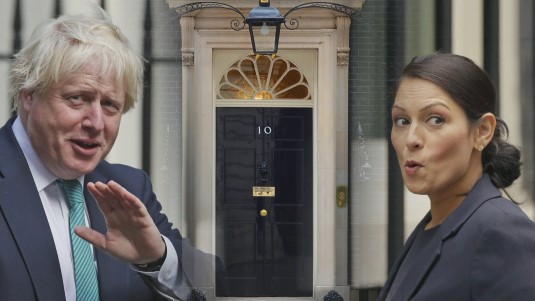
Okay. According to the pundit chatter of the last few weeks Johnson's galaxy brain strategist, Dominic Cummings, is renowned for doing the most unpredictable things. And yet his form suggests not. A thought experiment: if you wanted to win the EU referendum for leave, does it take real strategic insight to come up with a play on people's anxieties and fears? Likewise, if your approach is about keeping together the Tory voter coalition which very nearly shattered during the EU elections, wouldn't you go hard on traditional Tory themes?
And so we have Crime Week, a set of overlapping policy announcements designed to hog the silly season headlines. This not-at-all-predictable splurge of positions and money are about seizing some much-needed political initiative on matters other than Brexit. The tough posture on crime and criminals gives the Tory editorial offices something uncontroversial to swallow and regurgitate and, crucially, attempts to wrestle the crime mantle back from Labour. After all, readers might remember Theresa May's attempts to capitalise on the jihadi knife attacks in London just prior to the general election and how it didn't stick thanks to her record of cutting back on coppers and the failure to fund their (admittedly problematic) Prevent strategy properly. The hope is the short sharp smack of punitive punishment combined with a more prisons/more screws/more plod pledge casts these unhappy episodes into the abyss and present Johnson's government as a clean break. It's about perception, the idea something is being done to arrest the knife crime epidemic and random violence. It's not about evidence, efficacy, or what does and doesn't work.
Will it work? After all, criminals are never going to attract sympathy from the rest of the population. And to have someone as hardline and vicious as Patel in post is unlikely to cost the Tories either. At least where one's toughness credentials are the main political currency, and the problems of nuance (and racism) aren't about to trouble the base unduly. Shall we remind ourselves of them? The Tory electoral coalition is disproportionately made up of the retired, of the petit bourgeois, sections of the middle class, and (traditionally) big capital. Furthermore, their ontologies - ways of being and becoming in the world - predispose them toward certain political cues. As explained a number of times, anxiety is constitutive of their existences as classes and strata. The petit bourgeois are always threatened by commercial realities dominated by big business, and jealously guards their property and income generated from the sweat of their brow - hence a general ill-disposal to trade unions, labour and social democratic parties, and socialism. The rightist middle class are typically managers, and their anxieties stem from the churn of change (restructures), career competition, the possibility of redundancy, and those assumed through the acquisition of property. And lastly, pensioners of all classes are subject to something akin to petit bourgeois pressures. Again, property is important but more so are fixed incomes and modest investments, which cannot be supplemented by re-entering the labour market in many cases. Add to this the anxieties attending the experience of old age, including dependence on the health system, and the (privatised) individuation consequent of retiring from work, you have sets of constituencies susceptible to having their fears exploited by anyone promising order, security and authority. Often sublimated into other vectors of uncertainty - Britain's place in the world, foreigners "coming 'ere", the acceptance of ethnic and sexual minorities by their children and grandchildren - these are fretted over and talked up by various politicians for influence and votes. And so it is with crime. The idea of the state as a big stick appeals because it is a forceful imposition of order on to a chaos they feel could overwhelm them.
How can Labour counter this? Pointing out the cynicism of the Tories and how their running down of policing and crime prevention did work to a degree in 2017, and has to be part of the strategic mix. But, ideally, we need to shift the parameters of the debate away from "hard" punishment versus "soft" rehabilitation and frame it more pragmatically in terms of what works, to borrow a favourite Tony Blair phrase. This, of course, is a stance that affirms rehabilitation and reform over the birching of scallywags. But ultimately, a crime and policing policy cannot stand on its own. The second aim, beyond the specific nuts and bolts of criminal justice, is the implementation of a programme that simultaneously makes crime less likely and de-weaponises it as a mobilising issue for the right. Again, part of our job is to demobilise the Tory condition while mobilising ours. The potency of the fear of crime can be reduced by addressing the anxieties that underpin the Tory mass electorate through other means, and is one reason why Labour's present package of measures for small business, skills retraining, and retention of current support for pensioners are all necessary.
Even where the Tories appear strong they are weak. And that is no less true when it comes to crime and policing.
3 comments:
I think it also true to say that the Tories secretly prefer crime to rise as this avoids the need to address wealth/income redistribution issues.Perhaps Labour/Corbyn should point this out in face to face debates (Although unlikely Johnson would have the guts to do this).
It's not quite an Emily Thornberry White Van tweet, but I would be interested on some self-reflection from you on why 'foreigners "coming 'ere" ' came so naturally to your keyboard. Distancing by using a spelling representation of working class speech as a shorthand for stupid and unenlightened is not a good look.
Look at the context. It's about pensioners. And coming from a working class background, this is how most pensioners I know speak. And it's how I speak ta very much.
Post a Comment